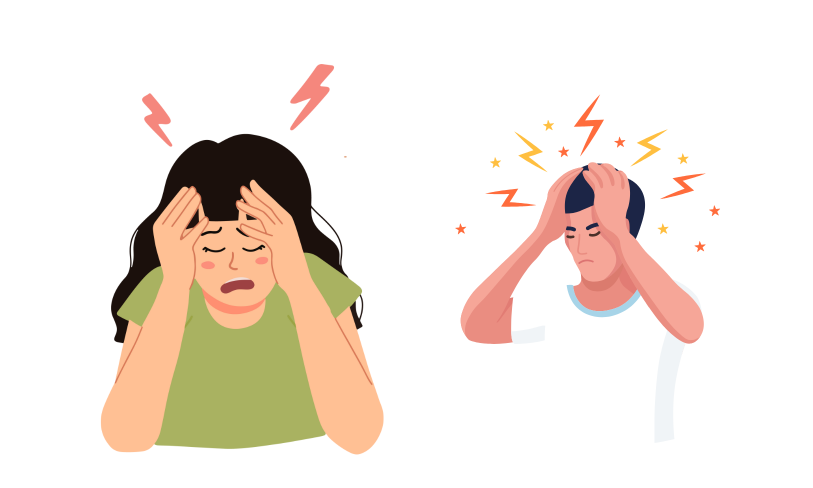Understanding Headache and Migraine
Information by Dr. Ritwiz Bihari
Category: headache-pain

What is Migraine?
Migraine is a neurological condition characterized by recurrent episodes of moderate to severe headaches, often accompanied by other symptoms such as nausea, vomiting, and sensitivity to light and sound. It can significantly impact daily life and productivity.
Symptoms of Migraine
- Headache: Typically throbbing or pulsating, often on one side of the head.
- Sensory Disturbances: Aura may precede or accompany the headache, involving visual disturbances (flashes of light, blind spots), tingling sensations in the face or hands, or difficulty speaking.
- Nausea and Vomiting: Many migraine sufferers experience gastrointestinal symptoms during attacks.
- Sensitivity to Light and Sound: Bright lights and loud noises can exacerbate migraine symptoms.
- Duration: Migraine attacks can last anywhere from a few hours to several days.
Diagnosis
Diagnosing migraine involves a thorough medical history and physical examination to rule out other potential causes of headaches. Your doctor may also recommend imaging tests, such as MRI or CT scans, to rule out underlying conditions.
Treatment
- Acute Treatment: Medications taken at the onset of migraine symptoms to relieve pain and associated symptoms. Examples include over-the-counter pain relievers (e.g., ibuprofen, acetaminophen) and prescription medications such as triptans and ergotamines.
- Preventive Treatment: For individuals with frequent or severe migraines, preventive medications may be prescribed to reduce the frequency and severity of attacks. These may include beta-blockers, antidepressants, anti-seizure medications, or Botox injections.
- Lifestyle Modifications: Practicing relaxation techniques, maintaining a regular sleep schedule, staying hydrated, and avoiding triggers can help reduce the frequency and severity of migraines.
Triggers
Migraine triggers vary among individuals, but common triggers include:
- Stress: Emotional stress or tension can trigger migraines.
- Hormonal Changes: Fluctuations in estrogen levels, such as those that occur during menstruation, pregnancy, or menopause, can trigger migraines in some individuals.
- Dietary Factors: Certain foods and beverages, such as aged cheeses, processed meats, alcohol, and caffeine, may trigger migraines.
- Environmental Factors: Bright lights, strong odors, changes in weather, and high altitudes can trigger migraines in susceptible individuals.
- Sleep Disturbances: Changes in sleep patterns or inadequate sleep can trigger migraines.
Prevention
While it's not always possible to prevent migraines entirely, you can reduce the frequency and severity of attacks by:
- Identifying Triggers: Keep a migraine diary to track potential triggers and avoid them whenever possible.
- Maintaining a Healthy Lifestyle: Eat regular meals, stay hydrated, exercise regularly, and practice stress-reduction techniques such as yoga or meditation.
- Establishing a Regular Sleep Routine: Aim for consistent sleep schedules, and ensure you're getting adequate rest each night.
- Medication: If prescribed preventive medications, take them as directed by your healthcare provider.
Conclusion
Migraine is a complex neurological condition that can significantly impact quality of life. By understanding its symptoms, triggers, and treatment options, individuals can better manage their condition and reduce the frequency and severity of migraine attacks. If you experience frequent or severe headaches, consult with your healthcare provider for proper evaluation and management.